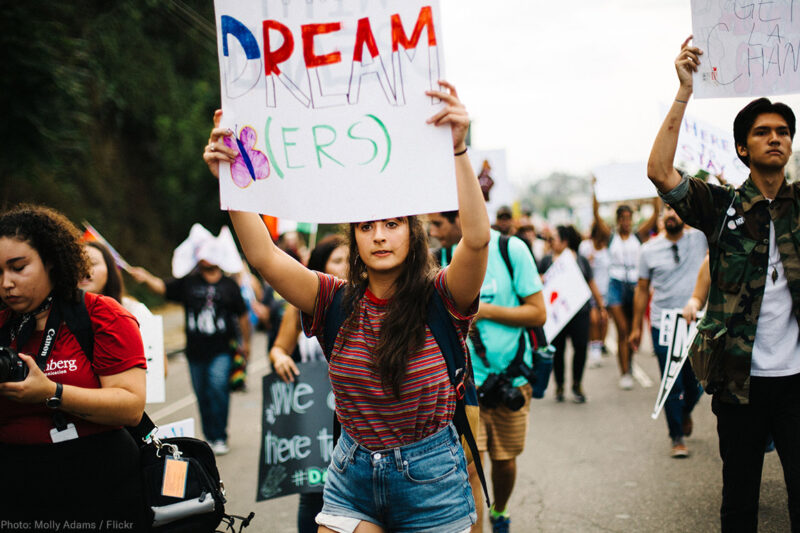
UPDATE: On August 31, a Texas district court judge to issue an injunction to stop the government from processing DACA renewals. Texas and six other states had requested the injunction. The result of the decision is that the status quo remains unchanged: The government is still processing DACA renewals but not initial DACA applications. (Although a district court in D.C. ordered the government to begin accepting new applications, the ruling was also stayed, or paused.) This state of affairs is likely to continue for several months until the Supreme Court weighs in on the Trump administration’s decision to end DACA. Stay tuned.
It was nearly a year ago that President Trump announced the end of Deferred Action for Childhood Arrivals, the program that gave some 800,000 young people who grew up in this country the opportunity to live and work here legally. Since then, there have been multiple lawsuits challenging the Trump administration’s decision to shut down the program, but also one challenging the legality of continuing it.
With new developments every few weeks, it is easy to lose track of what’s been happening in the courts. Here’s what you need to know.
Challenging DACA's Rescission
In California, New York, and Washington, D.C., plaintiffs have challenged the Trump administration’s decision to rescind the DACA program as arbitrary and capricious under the Administrative Procedure Act, a law that governs federal agencies. Courts in California and New York ordered the government to continue processing DACA renewals, but they did not order it to process new applications.
Per those orders, the U.S. Citizenship and Immigration Services agency is still processing DACA renewal applications.
Last Friday, August 3, the district court judge in the Washington, D.C., case the Trump administration to begin accepting new DACA applications — in addition to the renewal applications that it is already processing. But the court stayed its order for 20 days to allow the government to seek a stay and appeal on an emergency basis.
We do not yet know what the administration will do next in this case, but it has not sought a stay in either the New York or the California case. That means that the government’s next move in the D.C. case will not affect the court orders in New York and California requiring USCIS to continue granting DACA renewals.
All of that bodes well for current and potential DACA recipients.
Challenging DACA's Legality
But the program still very much hangs in the balance because Texas and six other states are challenging the legality of the DACA program itself. On Wednesday, August 8, the district court in Texas will hold a hearing in that lawsuit, and it’s possible that the judge could issue an order ending the program any time after that hearing.
To be clear, such an order would be wrong: Not only is the DACA program legal, but if the Texas court were to strike it down, its order would directly conflict with the orders issued by the California, New York, and Washington courts. If the government were subject to such conflicting orders, it would likely seek relief from the Supreme Court quickly, and no one knows for certain how the Supreme Court would rule.
Because of the possibility that the Texas court will issue an unfounded order that leads to faster Supreme Court review, we recommend that DACA recipients who are eligible for renewal submit their applications as soon as possible. If the DACA program is struck down, you could lose your application fee, but applying sooner increases the chance that you will be able to renew while the program is still available.
Now, as before, if the government has terminated your DACA unfairly, please send an email to DACARevoked@aclu.org. Our class action challenging unfair DACA terminations might be able to help you.
For more information on the pending litigation, please see this resource from the National Immigration Law Center: .

